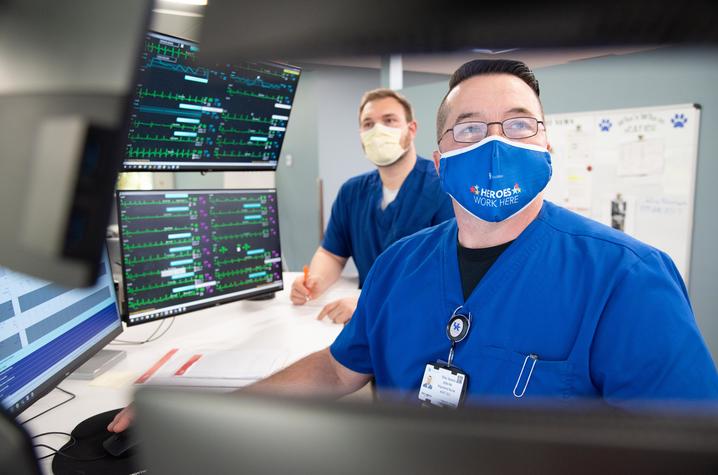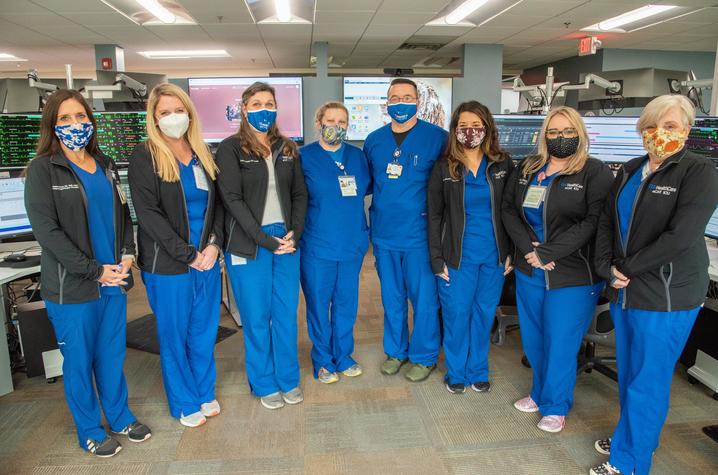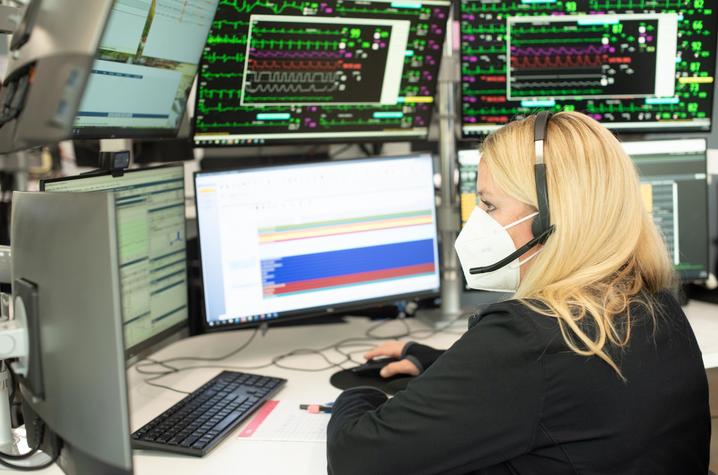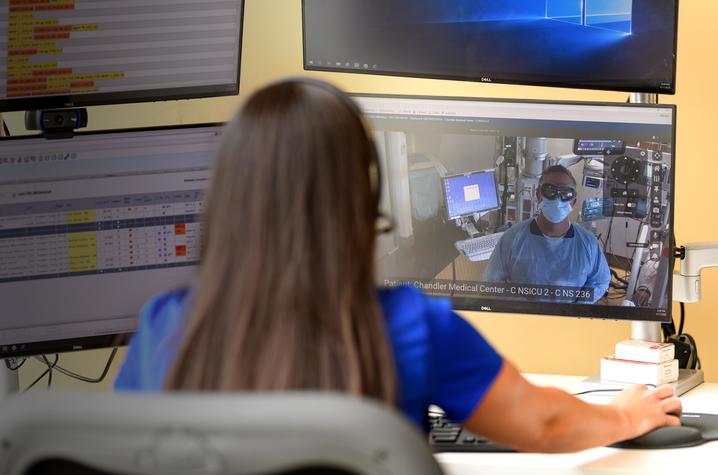UK HealthCare’s eCAT ICU Team Provides Hi-Tech Bedside Support
LEXINGTON, Ky. (Dec. 14, 2020) — Miles from UK HealthCare’s intensive care units ICUs), in a room with as many computer monitors as a NASA command center, a team of critical care nurses examine patients’ vital signs, review lab results and assist care teams with urgent assessments.
UK HealthCare’s Enhanced Care through Advanced Technology Intensive Care Unit (eCAT ICU), the only program of its kind in Kentucky, began last spring but more recently moved to a new permanent home off Alumni Drive in Lexington.
Royal Philips, a global leader in health technology, and UK HealthCare announced a collaboration to create the clinical command center for tele-critical care earlier this year. Using Philips’ acute telehealth platform, eCareManager, analytics and AI are used to synthesize patient data and deliver insights to support care. This means that although they are miles from their patients, UK HealthCare’s eCAT ICU team uses advanced surveillance technology to monitor patients and interpret clinical algorithms and protocols that can detect changes in a patient’s status.
Known as the eICU COR-central operations room, the command center has 12 stations with each station having eight monitors that are pulling in specific analytics from the eCareManager. The team currently is using six or seven stations at a time but can expand to eventually assist not only UK HealthCare patients but those in ICUs across the state and beyond.
Meanwhile, back in the patient rooms,168 adult critical care beds at UK Chandler Hospital and UK Good Samaritan have been hardwired for the eICU system. In addition, 25 mobile carts are being used in various parts of the hospital to also connect patients to the eICU.
“From the nursing side, the eICU has allowed us to support the bedside nurse by providing both critical care knowledge as well as providing essential care in the form of drip checks and medication checks and evaluation of the patient,” said Julia Blackburn, eICU operations director. “They are a second set of eyes.”
By using the eCareManager, data on a patient is coming in from the electronic health record as well as real-time data happening with the patient, said Jessica Porter, eCAT ICU program coordinator and nursing manager. “It may be very small minute changes to the bedside nurse because they aren't seeing it happen consistently, but we are. From shift to shift, we can share information with the bedside nurse and get a better outlook from what's happening from the entire patient stay.”
Registered Nurse Michael Skeens is a member of the team working in the eCAT ICU providing extra eyes and support.
“I've been a critical care nurse for over 22 years, and I've seen a lot of progressions. When I started, we were still documenting on paper, so I've been through a few changes,” he said. “This is probably the biggest advancement that I've seen in nursing, critical care in particular, where we have an insight into what's going on.”
When he joined UK HealthCare’s new eCAT ICU, the coronavirus pandemic also was hitting the U.S. Soon Skeens and the eCAT ICU staff found themselves assisting the beside teams in ways they could not have imagined.
“We have been able to really help with how often the nurses and the physicians have to actually go in and out of the patient room,” said Porter. This helps lessen the chances of exposure and helps save personal protective equipment.
In addition, with visitor restrictions in place, the eICU team also found ways to provide the much-needed connection between patients and families when they began facilitating virtual visits helping to keep them from feeling lonely or isolated.
“When we had the training through Philips, they mentioned that we could do this, but we didn't really explore it all that well because it's not something that everybody was doing routinely, Skeens said.
To date, he along with the other critical care nurses have facilitated hundreds of video calls often reaching out to invite multiple family members to check in with a loved one.
“We've had up to five family members, both local and spread out across the United States, that we brought (virtually) into the rooms where otherwise their ability to visit would have been severely restricted,” he said. “I can only imagine how I would feel if I couldn't get in to see my family and I was really grateful to be able to provide that opportunity.”
The success of the eCAT ICU now has UK HealthCare looking externally to provide this resource to other hospitals that could benefit from having a critical care nurse and board-certified critical care medicine physician assist with the care of their patients.
“The main goal of offering this externally would be that we could help support those hospitals in managing patients that could stay in the community and prevent them from having to transfer to Lexington where their family and loved ones aren't close by,” Blackburn said. “We want to provide that resource to community hospitals, so they can keep patients close to home and then, hopefully, early identify patients that might need the kind of care we provide here at UK and get those transfers in as quickly as possible.”




As the state’s flagship, land-grant institution, the University of Kentucky exists to advance the Commonwealth. We do that by preparing the next generation of leaders — placing students at the heart of everything we do — and transforming the lives of Kentuckians through education, research and creative work, service and health care. We pride ourselves on being a catalyst for breakthroughs and a force for healing, a place where ingenuity unfolds. It's all made possible by our people — visionaries, disruptors and pioneers — who make up 200 academic programs, a $476.5 million research and development enterprise and a world-class medical center, all on one campus.




